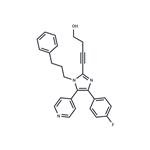Uses
RWJ-67657 is a p38 mitogen-activated protein-kinase (p38MAPK) inhibitor. Studies show that RWJ-67657 might provide a useful tool to intervene in the deranged immune response in sepsis and other inflammatory diseases. RWJ 67657 has been shown to inhibit chemokine production and E-selectin expression in activated endothelial cells,
Biological Activity
rwj 67657 is an orally active inhibitor of the map kinases p38α and p38β.tumor necrosis factor-alpha (tnf-alpha), a cytokine secreted by activated monocytes/macrophages and t lymphocytes, is implicated in several disease states, such as inflammatory bowel disease, rheumatoid arthritis, septic shock, as well as osteoporosis. the monocyte/macrophage production of tnf-alpha is dependent on the mitogen-activated protein kinase p38.
in vitro
rwj 67657 could inhibit the release of tnf-alpha by lipopolysaccharide-treated human peripheral blood mononuclear cells, as well as the release of tnf-alpha from peripheral blood mononuclear cells treated with the superantigen staphylococcal enterotoxin b. rwj 67657 was about 10-fold more potent than the literature standard p38 kinase inhibitor sb 203580 in all tested p38 dependent in-vitro systems tested. moreover, rwj 67657 was able to inhibit the enzymatic activity of recombinant p38alpha and beta, but not gamma or delta, and showed no significant activity against various other enzymes. in contrast, sb 203580 could significantly inhibit the tyrosine kinases p56 lck and c-src. in addition, rwj 67657 did not inhibit t cell production of interleukin-2 or interferon-gamma and did not inhibit t cell proliferation in response to mitogens [1].
in vivo
animal study found that rwj 67657 could inhibit tnf-alpha production in lipopolysaccharide-injected mice (87% inhibition at 50 mg/kg) and in rats (91% inhibition at 25 mg/kg) after oral administration [1].
IC 50
1 and 11 μm for p38α and p38β, respectively
References
[1] wadsworth, s. a.,cavender, d.e.,beers, s.a., et al. rwj 67657, a potent, orally active inhibitor of p38 mitogen-activated protein kinase. journal of pharmacology and experimental therapeutics 291(2), 680-687 (1999).
![4-[4-(4-Fluorophenyl)-1-(3-phenylpropyl)-5-(4-pyridinyl)-1H-imidazol-2-yl]-3-butyn-1-ol Structure](https://www.chemicalbook.com/CAS/GIF/215303-72-3.gif)

